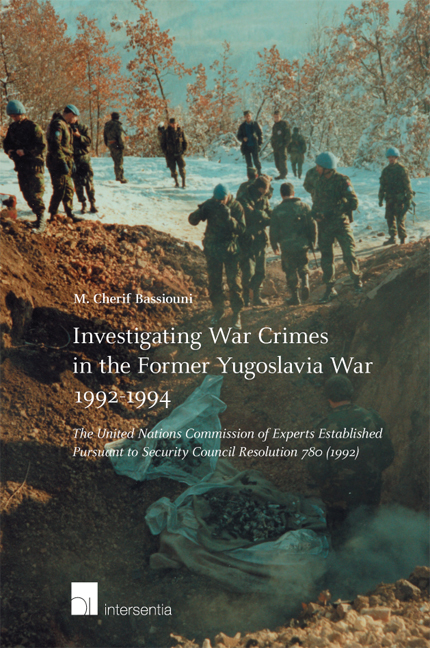 Investigating War Crimes in the Former Yugoslavia War 1992–1994
Investigating War Crimes in the Former Yugoslavia War 1992–1994 Book contents
- Frontmatter
- Contents
- Dedication
- About this Book
- About the Author
- Acknowledgement
- Table of Abbreviations
- Table of Authorities
- Chapter I Background on the Conflict in the Former Yugoslavia
- Chapter II Some Pictorial Descriptions
- Chapter III An Overview of the Realpolitik and the Workings of the Commission of Experts
- Chapter IV Precedents Leading to United Nations Security Council Resolution 780 (1992)
- Chapter V The Commission of Experts’ Establishment and Processes
- Chapter VI Final Report of the Commission of Experts Established Pursuant to Security Council Resolution 780 (1992) and Annex Summaries and Conclusions
- Chapter VII The Absence of a Transition between the Commission of Experts and the ICTY
- Chapter VIII Experiences that Affected Me the Most During My Tenure on the Commission of Experts
- Chapter IX Concluding Reflections
- Frontmatter
- Contents
- Dedication
- About this Book
- About the Author
- Acknowledgement
- Table of Abbreviations
- Table of Authorities
- Chapter I Background on the Conflict in the Former Yugoslavia
- Chapter II Some Pictorial Descriptions
- Chapter III An Overview of the Realpolitik and the Workings of the Commission of Experts
- Chapter IV Precedents Leading to United Nations Security Council Resolution 780 (1992)
- Chapter V The Commission of Experts’ Establishment and Processes
- Chapter VI Final Report of the Commission of Experts Established Pursuant to Security Council Resolution 780 (1992) and Annex Summaries and Conclusions
- Chapter VII The Absence of a Transition between the Commission of Experts and the ICTY
- Chapter VIII Experiences that Affected Me the Most During My Tenure on the Commission of Experts
- Chapter IX Concluding Reflections
Summary
This book contains the Final Report and Annexes (the latter is available online through Intersentia Publishing) of the Commission of Experts Established Pursuant to United Nations Security Council Resolution 780 (1992). The Commission of Experts was the first international initiative to advance international criminal justice since the post-WWII experiences. The Cold War had brought a sharp stop to the international community's efforts to advance international criminal justice. As such, it was befitting for the Security Council to establish such a Commission of Experts, whose mandate was to investigate violations of international humanitarian law committed in the territory of the former Yugoslavia in the early 1990s.
The Commission of Experts’ investigation, which was originally intended to be something of a continuation of post-WWII prosecutions, was politically challenging because some of the European countries most directly involved at the time were focused on bringing about a political settlement. To them, pursuing peace and justice at the same time was simply impossible.
The United Kingdom's Lord Peter Carrington and then Lord David Owen, representing the European Union, were pursuing a political solution. They probably believed that negotiating with the heads of the warring factions of the time would not be possible if the factions’ leaders knew they were being investigated by a UN commission – and were likely to be charged with war crimes and crimes against humanity. Perhaps those involved in the political settlement negotiations also contemplated offering some sort of immunity to the leaders, and maybe a few others, as a quid pro quo for agreeing to a political settlement. And that would not have been possible with a United Nations fact-finding body in place and functioning.
Whatever their reasons, those active in the political settlement field, particularly the negotiators from the United Kingdom, first fought the establishment of the Commission of Experts and then, used bureaucratic and financial means to thwart the Commission's work.
The Commission of Experts’ work was a long and arduous battle because of the political, financial and bureaucratic obstacles it faced, as well as the horrific nature of the alleged crimes. But it ended with invaluable, credible evidence, documenting atrocious crimes.
- Type
- Chapter
- Information
- Investigating War Crimes in the Former Yugoslavia War 1992–1994The United Nations Commission of Experts Established Pursuant to Security Council Resolution 780 (1992), pp. xv - xviiiPublisher: IntersentiaPrint publication year: 2017


